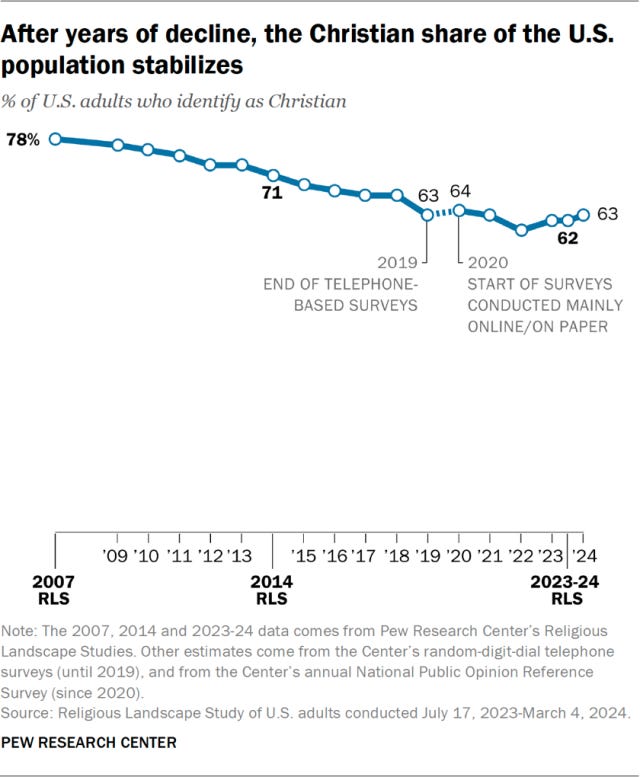You’ve probably seen the news that after a long period of decline, Pew reports the number of American adults identifying as Christians has plateaued. The numbers aren’t growing, but they’re not falling anymore either — for now — and while that’s probably not the end of the trend, it’s still pretty notable news.
Reading the study, my mind jumped back a few years to a piece I wrote for The Week, linking the end of Christian domination in America to the evangelical embrace of Donald Trump. “Trumpism,” I wrote then, “might be both the beneficiary and accelerant of Christianity's loosening grip on the culture.”
But: We still have Trump.
You might say we have more of him then ever. And yet the decline of Christianity seems to have been arrested. Was my theory from 2021 half-baked?
Maybe. Maybe not.
Here’s the New York Times in January 2024:
Evangelicals are not exactly who they used to be.
Being evangelical once suggested regular church attendance, a focus on salvation and conversion and strongly held views on specific issues such as abortion. Today, it is as often used to describe a cultural and political identity: one in which Christians are considered a persecuted minority, traditional institutions are viewed skeptically and Mr. Trump looms large.
“Politics has become the master identity,” said Ryan Burge, an associate professor of political science at Eastern Illinois University and a Baptist pastor. “Everything else lines up behind partisanship.”
Indeed, Burge said in a later post, “the share of evangelicals who never attend has more than tripled to 10% and then an additional 17% attend 'seldom'.” Which is another piece of evidence to suggest that the evangelical slice of Christianity is increasingly a political identity, not a religious one.
And that, in turn, makes me wonder if the broader Christian resurgence reported by Pew — OK, it’s not a resurgence but I’m tired of using the word “plateau” — might reflect that same trend.
Is the plateau a come to (or stay with) Jesus moment?
Or is it a come to Trump moment?
A friend who is connected in Christian intellectual circles says the answer is probably “a little bit of both.” This friend would know better than I. But I will say that it matters of course, and not just to the souls of the people directly involved.
My own faith, of course, is practically non-existent these days. On the whole, though, I’d rather live in a society whose religious people believe in a higher power calling them to higher purposes than one whose religion boils down to our current president.
Jesus? Or Trump? I know which one I’m hoping for.






President Trump did not get my vote due to Evangelism. His policies however did match up to a certain extent with my hopes. No religion is a monolith with all believing to the same degree.
There is always Pascal's Wager for those on the fence about religion.
Wow! I'm encouraged by this Joel as I've been feeling a similar shift taking place. I definitely lean toward the side of your theory that suggests people are untangling God and Jesus from Trump and the Right, partially because the progressive-leaning Episcopal church I attend in Denver has been packed cheek to jowl of late.
I just published this piece yesterday offering my own take on this phenomenon. I'd love if you checked it out!
https://open.substack.com/pub/inprog/p/is-trump-doing-god-a-huge-favor?r=a1bce&utm_campaign=post&utm_medium=web&showWelcomeOnShare=false